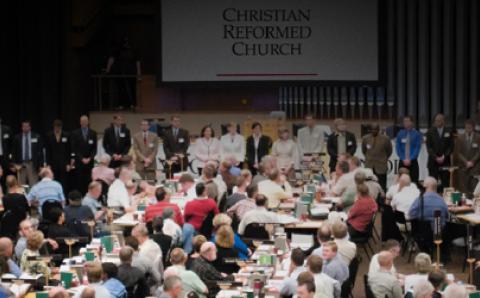The carpet of the old church floor dug into my knees. I knelt before the congregation, humbled, as the same body of believers who witnessed my baptism and vowed to love and pray for me received me as a full member. I offered my life back to Christ, within the context of the Christian Reformed Church. That was five years ago.
After leaving my quaint hometown of New Holland, South Dakota, I realized for the first time that church, and my personal faith, was now my responsibility. Transitioning to college, I was eager to share my gifts by becoming involved in another Christian Reformed congregation. The CRC had baptized me, trained me in GEMS (girls’ club), Sunday school, and catechism, and recognized me as a member, and I was eager to see what was next.
Within the first few weeks I began to feel a disconnect between the promises I had made in my home church and my new life. There were no more catechism classes to attend or a version of GEMS for college-age women. The worship bulletins of the churches I visited listed children’s ministries and youth group events, then jumped straight to marriage seminars. My peers and I seemed overlooked and forgotten.
The church has not often used or encouraged our gifts during the time of our lives when we are the most passionate, energetic, and available.
Will you make room for us at the table?
Since finding a church did not happen as naturally as I had hoped, I began exploring congregations from different denominations, including Evangelical Free and Reformed Church in America, even nondenominational (and, I regret to admit, I was often a member of the “Bedside Baptists”).
I was curious whether this disconnect came from me and my unwillingness to commit, or whether the CRC was struggling to connect with my generation. Nearly ready to give up finding my place in the church, I saw a note on Facebook about a CRC initiative to gather some Gen-Y-ers (18- to 30-year-olds) together to discuss this very matter, in search of a solution. Ecstatic to discover others who felt they, too, had fallen into the gap between catechism and marriage, I agreed to join in.
Last August more than 30 young adults (Generation Ys, Millenials—call us what you want) from all over North America met in Grand Rapids, Mich., to discuss why we felt our generation was being overlooked, forgotten, and disconnected from the denomination.
Ideas buzzed around the room as young leaders committed to doing all we can to bring our generation back into the denomination whose doctrine we believe in, back to a worldwide congregation of believers we want to support and need support from, and ultimately back to a central place of belief and understanding we desperately cling to.
The following paragraphs summarize our discussion. We pray and hope this will be the start of a dialogue that will fuse all the CRC churches together as one committed and whole body of Christ.
What We Love About the CRC
We began our conversation by asking What do we love about the CRC? What is it doing right to enfold multiple generations?
We appreciate the denomination’s steadfastness; we cling to its strong and unwavering doctrine. We are an indecisive generation, so it’s essential to have a rock-solid foundation that we can lean on and that we trust will never waver on the “big stuff” in life.
We do not find ourselves discouraged in church because the PowerPoints are not colorful enough or because the drums (if any) are not loud enough; nor do we have a burning wish to throw out the gray Psalter Hymnal.
Our concerns and desires have more to do with deeper relationships, passionate commitment, and convicting biblical messages.
The CRC is doing many things right, and even though we might not show it, we are extremely grateful for all that our church has invested in us. Last year young adults were given the ability to speak to the church on a denominational level through a youth advisory panel at synod, the CRC’s annual leadership meeting. That has been an amazing step in the right direction, but we would also like to be involved with leadership in our local congregations.
Such involvement requires that we hear and understand each other—bringing generations together.
Many of us are in transitional phases of life, and because of this we are looking for a church family. We desire church to be more than a place we visit on Sunday. We urgently seek a home in which we’re needed, a family who gives us responsibilities and holds us accountable to them.
Becoming a church member is a big commitment; it should be followed up with continued training, education, and decision-making roles.
What We Need from the CRC
Our generation embraces intense creativity and has different passions and ideas for worship. We desire to be one body—to learn, grow, and worship together—but at times we’re unsure how we can contribute to that. Sometimes we’re afraid of rejection or being misunderstood, but we’d love to begin respectful dialogues with all age groups on how we can approach new gifts and ideas in considerate, active ways.
Beyond that, we need involvement in intergenerational Bible studies and mentoring relationships. We want desperately to be discipled—strengthened, equipped, and empowered—by those who are more spiritually mature than we are and who have traveled the road ahead.
Unfortunately, while the church does a great job caring for families with young children, it has not often used or encouraged young people’s gifts during the time of our lives when we are the most passionate, energetic, and available.
We have hearts that yearn for ministry but sometimes see it in unconventional ways that the church does not understand. We envision ministry as every Christian’s calling, whatever his or her life stage. We want to engage in conversations about this as disciples eager to reach out to a hurting world that needs a Savior, whether overseas or across the street. And we believe doing so will require us all to push beyond what is comfortable and known—for comfortable faith too easily becomes stagnant faith.
My generation calls out to the church, “Will you make room for us at the table?” We need what the church has to offer. We want to serve you and serve with you. We deeply desire to learn from you and want the opportunity to teach you. Will you help us bridge the gap?
Manifesto Excerpt
Our Vision
What would the church look like if all of the problems were resolved?
Intergenerational
Our church should be a place where all generations are valued and respected for what they bring to the family of God’s people. All generations have something unique to offer and yet much to learn. In this life, we never truly arrive at the destination of our faith journey. Our strength as a church consists of our relationships with one another and the strength of our love in action. After all, what would our church be without the praxis and zest of the young, or without the experience and wisdom of the old? We are weak when we divide ourselves, and strong when we experience all of life together.
Intercultural
Our denomination is becoming increasingly diverse. As this beautiful diversity continues to grow, so must our awareness and appreciation for the differences between our various cultures and heritage. Likewise, we must discern which parts of our heritage that might stand in the way of the advancement of the kingdom and sacrifice them for the cause of the gospel. Adaptation and accommodation is necessary for all cultures to preserve the unity of the church and the success of its mission. We must look to heaven and be inspired by the vision of a multi-ethnic congregation of believers, embracing cultural diversity not for its own sake, but because it reflects God’s boundless love for his people.
Excerpted from the “Young Adult Manifesto” for the CRC, p. 12. For the full version, see http://issuu.com/kkruithoff/docs/color_-_young_adults_in_the_church.
For Discussion
- Think about a young adult you know (post high school). In a few words, describe that person’s relationship to the Christian Reformed Church.
- What do the young people profiled in this article ask of the church? What do they offer the church?
- Do you think the CRC is ready to accept their offer and challenge? Why or why not?
- How do you see this dialogue taking place in your local church and in the denomination?
- What can you do individually to strengthen the faith of the young people you know and to encourage their membership and participation in the church?
About the Author
Chelsey Munneke graduated this spring from Dordt College in Sioux Center, Iowa, where she studied public relations and journalism. She is an original member of the young adult initiative of the Leadership Exchange (www.crcna.org/leadership) and currently blogs for Focus on the Family.








